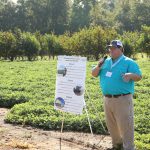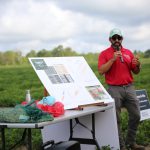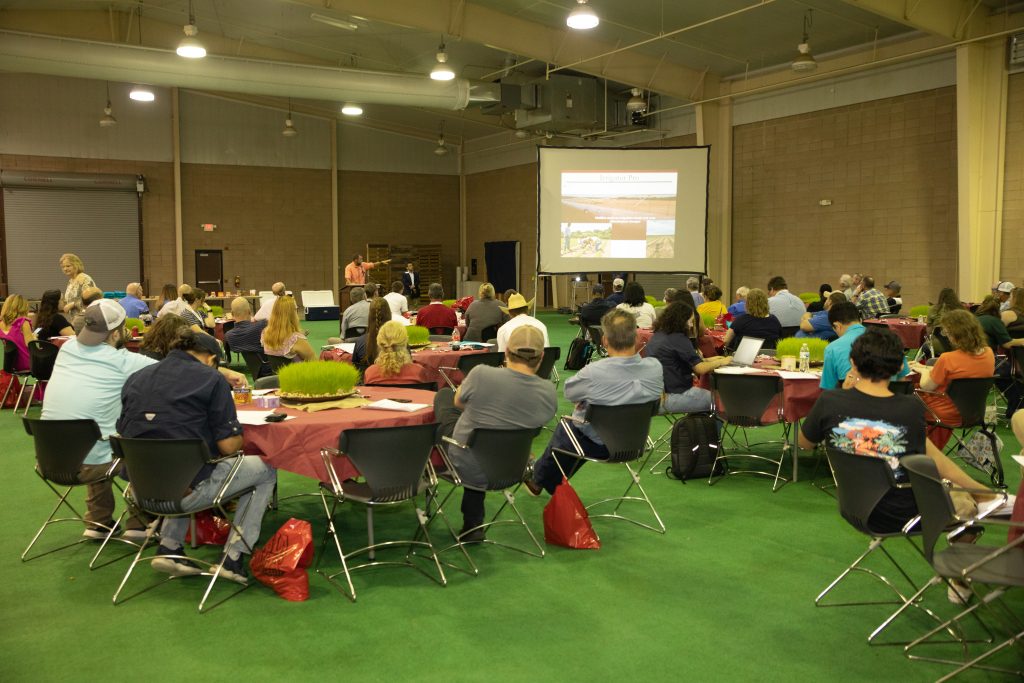 Jake Fountain, mycotoxin and post-harvest pathogen specialist at the University of Georgia, provided an update on his research program during the 2023 Georgia Peanut Tour. Fountain’s research program primarily focuses on aflatoxin issues in peanuts and also other crops overall.
Jake Fountain, mycotoxin and post-harvest pathogen specialist at the University of Georgia, provided an update on his research program during the 2023 Georgia Peanut Tour. Fountain’s research program primarily focuses on aflatoxin issues in peanuts and also other crops overall.
His lab is working on a few different research directions to try to mitigate aflatoxin issues including host plant resistance. Through the research, he is looking at bringing genetics from wild species of peanuts to new breeding lines in order to improve the resistance of peanuts to aflatoxin issues.
The second area we work on is detection for aflatoxins. Fountain works closely in collaboration with other UGA and USDA research scientists to develop technology to do hot spot prediction using drone technology equipped with fancy cameras to try to find spots in the field that are at higher risk for aflatoxin issues. He is also working closely with this group to try to look at the soil microbiology associated with those hot spots and see if they are at a greater risk for having isolates of the aspergillus fungus that make more amounts of aflatoxins.
The third focus area is looking at the pathogens’ biology. There’s still a lot of questions about why this fungus produces aflatoxin in the first place. What controls how much it makes and how it actually gets into peanuts.
Fountain is looking at doing a survey of aspergillus fungus associated with peanuts here in the Southeast. Primarily, here in southern Georgia in collaboration with Premium Peanut and other UGA scientists and also Hudson Alpha in Huntsville, Alabama, Fountain is looking at doing genome sequencing and understanding the genetics of this fungus.
Finally, we’re looking at biotechnology right now. GMO peanuts are not something that the peanut industry here in the U.S is really exploring using due to export concerns and public perceptions. The technology that’s used in GMOs can be very useful for aflatoxin prevention so what Fountain is trying to do now is to develop a kind of biotech pesticide that uses the same type of technology that would go into GMO but can be applied as a spray to non-GMO peanuts and hopefully provide the same level of effect to reducing aflatoxins.
“Overall, this year we’re looking at a pretty good crop with reduced aflatoxin and risk,” Fountain says. “However, vigilance is always the key and we’re hoping that our research programs help fill in some gaps and help with the mitigation of aflatoxin for our growers here in the state.”

 Nino Brown, University of Georgia peanut breeder provided an update to 2023 Georgia Peanut Tour attendees on the peanut breeding program at the university. Brown works closely with Bill Branch, peanut breeder at the University of Georgia, as they work to develop new cultivars or varieties of peanuts for growers in Georgia and beyond.
Nino Brown, University of Georgia peanut breeder provided an update to 2023 Georgia Peanut Tour attendees on the peanut breeding program at the university. Brown works closely with Bill Branch, peanut breeder at the University of Georgia, as they work to develop new cultivars or varieties of peanuts for growers in Georgia and beyond. The 35th annual Georgia Peanut Tour kicked off with a Hot Topics seminar on Tuesday, Sept. 12 at the Cloud Livestock Pavilion in Bainbridge, Georgia. The seminar provided an update on the 2023 peanut crop as well as an update on the farm bill and other legislative activities that can have an impact on the peanut industry. Each year the seminar also highlights some of the latest hot topics happening in the industry and this year’s special focus included advancements in integrative precision agriculture for enhanced peanut production and processing. The speakers provided an overview of the University of Georgia FoodPIC Center and the USDA Peanut Germplasm Collection as well as information on irrigation technologies and precision agriculture in peanut production.
The 35th annual Georgia Peanut Tour kicked off with a Hot Topics seminar on Tuesday, Sept. 12 at the Cloud Livestock Pavilion in Bainbridge, Georgia. The seminar provided an update on the 2023 peanut crop as well as an update on the farm bill and other legislative activities that can have an impact on the peanut industry. Each year the seminar also highlights some of the latest hot topics happening in the industry and this year’s special focus included advancements in integrative precision agriculture for enhanced peanut production and processing. The speakers provided an overview of the University of Georgia FoodPIC Center and the USDA Peanut Germplasm Collection as well as information on irrigation technologies and precision agriculture in peanut production.